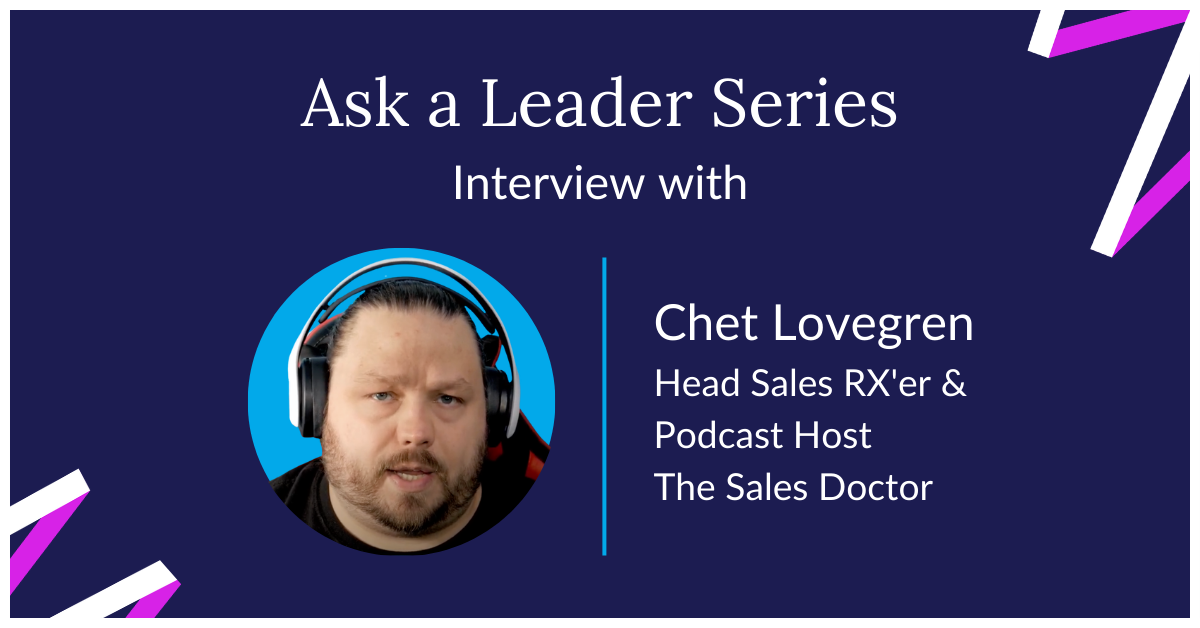In this interview with Chet Lovegren, Head RX'er and podcast host at The Sales Doctor, you’ll learn about the #1 mistake he sees sales leaders make all the time, what the best way to motivate a sales team is, what makes a leader a great one, what made Chet want to get into sales, and one of the biggest challenges he's had to overcome in his career.
1. What's the #1 mistake you see sales leaders make?
I think it's making knee-jerk reactions to things and then implementing processes and accountability behind those things without understanding what should really be done and why it's a problem.
You know, is it a pain point? Or is it a problem in sales? We don't solve pain points, we solve problems. You don't go to the doctor for pain, you go to the doctor for problems, because problems typically lead to death. And it's the same thing in sales as far as leaders are concerned.
Why do we spend so much time racking our brain and knee-jerk reacting to pain points that we might have, as opposed to looking at problems and how to solve actual problems and understanding why is it a problem?
What can I do to solve it before just rolling a bunch of stuff on the wall and seeing what sticks.
So I think one of the biggest mistakes I see sales leaders make all the time is having knee-jerk reactions to things and providing low-value, quick and easy fixes that don't amount to any ROI.
2. What would you say is the best way to motivate a sales team?
A lot of people are controversial about whether money is a great motivator or not. I think it is. It's definitely not the only motivator, but when you think of all the things that do motivate people, fear of loss, professional development, autonomy, all those things typically lead to more money in one way or another.
So you get better at your job, you become better, you professionally develop, you typically get promoted, you're gonna make more money, right? Fear of loss, if you don't do well, and you get fired, you don't have money. Security, right? You build a lot of money over time because you stay gainfully employed–money.
So I really dislike when people say money isn't the motivator, because it really is. So even if somebody leaves the company, to go be an SDR at another company, because they've been promised a better promotion, path to AE. And if they get AE, they're gonna make more money. And same thing with AEs who want to become enterprise sellers, and AES who want to become future managers and leaders.
3. What makes a leader a great one?
Transparency is a huge one.
And it's not to say overshare, or pull back the company financials and let people know how scared they should be about their job security. If that's the situation your company's in right now, especially due to the recession.
But it's about owning the relationship between you and your employees. So the scapegoating leadership or the board or whatever, you know, you have to have a tough conversation. I see too many people walk into tough conversations with the reps and go, "Look, if this keeps happening, so and so above me is not gonna let us continue having you here."
But you need to own that relationship, you need to go and say, "Hey, we can't justify having you in the seat with the ROI that you're giving us. And we need to make a change. Let's work together to see this through. And if not, we can talk about what a transition plan looks like."
But a great leader can take ownership of the relationship to their employees' performance, without scapegoating the higher-ups or the people above them for the reason for bad news.
4. What made you want to get into sales?
I went to college to be a pastor. I have a pastoral studies degree with a minor in counseling. So being in front of people, speaking to people, leading people, helping people through trauma in hard times, is something that I'm used to.
And so in sales, you do a lot of the same stuff. If you're in sales for the right reasons, meaning you want to help buyers, you want to educate buyers who want to transform their businesses, right? People are typically coming to you when they have problems that they're looking to solve that are detrimental to their business. And being able to solve those problems for them can help them come through the other side, seeing a better light at the end of the tunnel and hopefully being successful with whatever solution or service that you're providing.
So I think it's kind of a similar thing, as well as transitioning that into leadership, right? Leading people, getting people bought in, motivating people to the extent of what you can as a leader when you're up there and doing all the rah rah rah and standing on the soapbox and delivering your speech and your passion. There are a lot of similar things that cross over.
I was in hospitality for a while and I loved hospitality. But I looked at my life and I said, you know, I want to have a family. I can't be getting off work at 2 am closing down a restaurant. So I decided that I needed to find a nine-to-five that fit my skill set. And that's where sales came in.
5. What's one of the biggest challenges you've had to overcome?
I was a professional seller for around seven years before I jumped into software sales. And it was about a nine-month process of me deciding I wanted to jump into software sales and actually landing my first software sales gig.
It was because a lot of companies I would interview for, these SMB mid-market roles, they would want me to be an SDR because I didn't have any previous tech experience. But I didn't want to settle for an SDR job, to do that for a year to then get promoted to what I rightfully knew I was owed and what I could do with my skill set. Because I was essentially a full-cycle AE when I was working in commercial insurance prior to that.
And it was funny because a lot of the commercial insurance deals I would close were 150 to $200,000 in annual insurance premiums that a business was paying us in exchange for a good or service. And the ACVs of a lot of these deals that these places I was interviewing at were like 10 to 15k. Like I've closed deals that were 10 or 20x the amount of ACV that your standard rep is closing in one deal, but yet, for some reason, because I don't know what the term KPI is, I can't get hired here.
So I held out and I eventually landed an account executive role and I jumped right in, and it was nine months after doing that role successfully that I moved into a management role where I was coaching and leading people on a daily basis.











